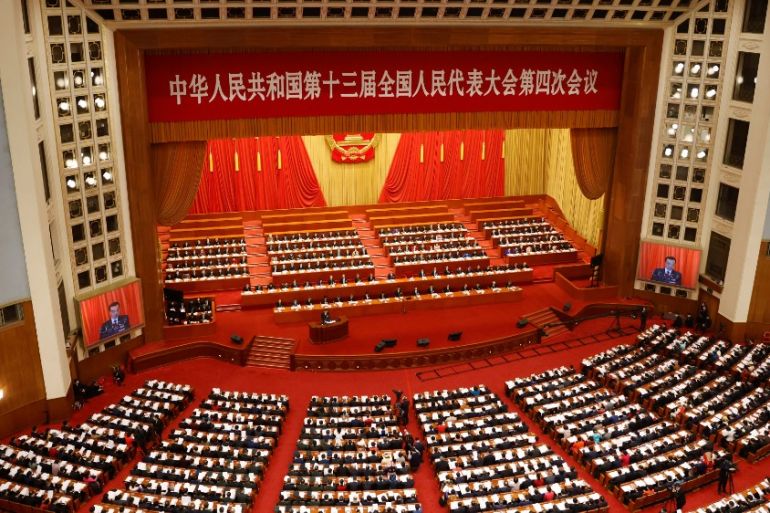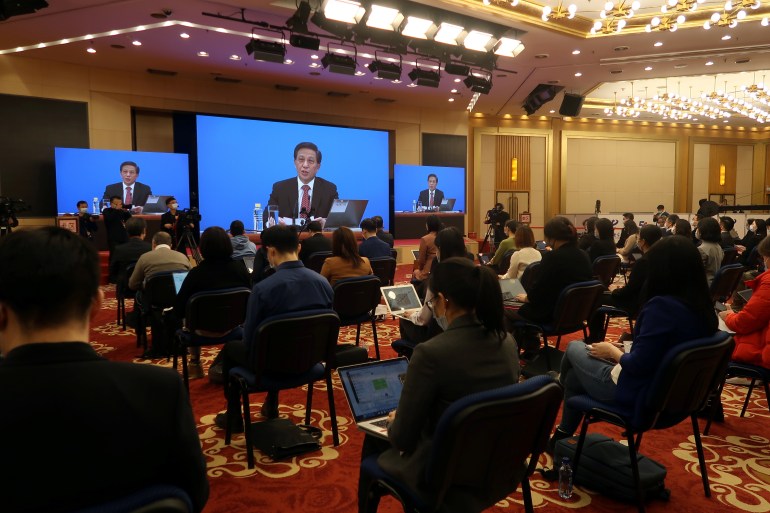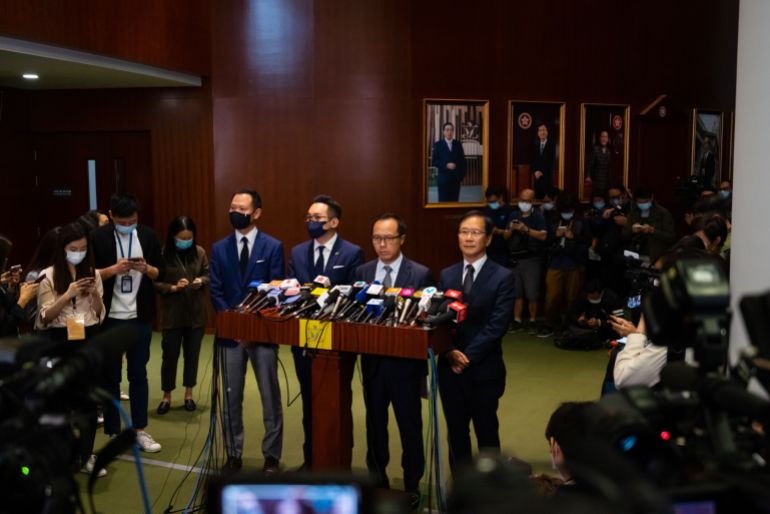‘Patriots’ only: China moves to overhaul Hong Kong elections
Legislative election to be delayed and rules changed in moves likely to further marginalise pro-democracy legislators.

Hong Kong is set for more political upheaval as China’s National People’s Congress (NPC) considers a proposal to overhaul the territory’s electoral system to ensure “patriots” are in charge, at its week-long annual meeting that began on Friday.
Ahead of the meeting, Zhang Yesui, a spokesman for the NPC, stressed that the rubber-stamp body had the constitutional power to “improve” Hong Kong’s system and that the electoral structure needed to fully implement the principle of “patriots governing Hong Kong”.
Keep reading
list of 4 itemsHong Kong elections in China’s sights as Parliament meets
UN rights chief decries abuses in Xinjiang, arrests in Hong Kong
Lam defends China’s plan to ensure only ‘patriots’ rule Hong Kong
Hong Kong’s Cable TV and Now TV, citing unnamed sources, said the changes would include increasing the size of the election committee that selects Hong Kong’s leader from 1,200 to 1,500 people, and the city’s legislature from 70 to 90 seats.
District councillors would also be removed from the committee that chooses the chief executive, while a new body would be set up under the chief executive to vet all candidates for elected office, according to Al Jazeera’s Katrina Yu who is monitoring events in Beijing.
Local media reported the already-delayed legislative council elections would be deferred for another year until September 2022.

Opening the NPC on Friday, Chinese Premier Li Keqiang said Beijing would “resolutely guard against and deter” interference by external forces in Hong Kong’s affairs.
“China has received a lot of international criticism over the past year due to its reforms in Hong Kong,” Yu said. “And China hasn’t responded with any concessions. It’s responded by doubling down and hardening its stance.”
A spokesman for the Hong Kong government said any changes to the rules governing elections were the “prerogative” of Beijing.
“Only through ‘patriots governing Hong Kong’ can the Central Government’s overall jurisdiction over the HKSAR be effectively implemented, the constitutional order as set out by the Constitution and the Basic Law be effectively safeguarded and the long-term stability and safety of Hong Kong be achieved,” the spokesman said in a statement released late on Thursday night.
According to an #NPC draft law on #HongKong Beijing will essentially remove much of the system’s democratic elements: shrinking the number of seats given to elected officials, adding seats from pro-China groups & giving Carrie Lam powers to screen Legislative Council candidates
— Katrina Yu (@Katmyu) March 5, 2021
Essentially HK’s LegCo will become a mainland-style provincial “people’s congress”, no longer a genuine independent legislature. Also marks the death of 3-way separation of powers in HK, effectively fusing the legislative & executive branches. Only the judiciary left to go… https://t.co/Q1VC9Z0Dk7
— Antony Dapiran (@antd) March 5, 2021
The reforms are likely to deal a serious blow to Hong Kong’s pro-democracy politicians and activists who have been under pressure since China imposed a broadly-worded national security law on the territory that had been swiftly approved at last year’s NPC.
Some have gone into exile while others are facing trial under the legislation.
Prominent pro-democracy campaigner and media tycoon Jimmy Lai is currently in jail pending trial under the law on charges of “foreign collusion” ,while 47 people accused of “subversion” for organising primary elections to choose their candidates for the delayed legislative election, were on Thursday also remanded in custody and mostly denied bail.
‘More than going backwards’
Hong Kong, previously a British colony, was guaranteed its widespread freedoms, extensive autonomy and capitalist way of life would continue for at least 50 years under the so-called “one country, two systems” framework devised during the run-up to the handover in 1997.
In the territory’s mini-constitution, the Basic Law, Beijing also promised universal suffrage as an ultimate goal, but over the past 20 years has been chipping away at the territory’s freedoms.
Currently 50 percent of the seats in the Legislative Council are chosen by direct election and pro-democracy candidates have traditionally done better than the establishment and pro-Beijing candidates.
“This is more than going backwards, it’s getting close to the opposite extreme, moving further away from universal suffrage,” said Ivan Choy, senior lecturer at Chinese University of Hong Kong’s department of government and public administration, referring to the planned changes.
Anger at China’s perceived tightening grip over the territory boiled over in 2019 after the Hong Kong leader Carrie Lam proposed an extradition bill to the mainland. Mass opposition to the law brought millions onto the streets beginning months of protests, which sometimes turned violent.

Despite Beijing’s expectation that the unrest would play into its hands during district council elections in November 2019 – amid a ferocious confrontation between police and protesters at the Polytechnic University – democrats won a landslide victory taking home nearly 90 percent of the 452 seats.
While the councils handle largely mundane tasks like rubbish collection, they are the city’s only fully democratic institution and the democracy camp had hoped to leverage on that success in the main legislative council.
Since then, however, councillors and Legislative Council members have been disqualified from office as “unpatriotic” prompting the mass resignation of the remaining Democrats in the Legislative Council.
Under the proposed changes, district council officials will no longer be part of the election committee or the Legislative Council, according to local media.
China says the security law has brought “stability” to Hong Kong, a theme echoed by Chief Executive Carrie Lam on Friday as she backed the latest changes to the electoral rules.
“It is a natural requirement that Hong Kong must be governed by patriots,” she said in a statement, adding that the changes will “restore law and order.”